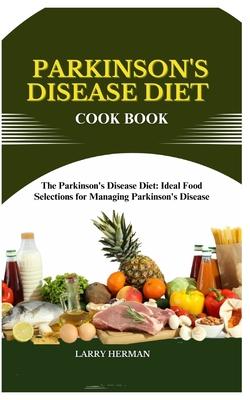
Book
Parkinson's Disease Diet Cook Book: The Parkinson's Disease Diet: Ideal Food Selections for Managing Parkinson's Disease
by Larry Herman
(Write a Review)
Paperback
$9.39
Notable Characteristics Of Parkinson's disease Include:
- Bradykinesia Is The Condition Characterized By A Reduced Speed Of Movement. People Diagnosed With Parkinson's Disease May Experience Challenges When Starting And Finishing Motions, Resulting In An Overall Decrease In Their Ability To Move Rapidly.
- Resting Tremors Are Prevalent Symptoms That Typically Occur In The Hands, Fingers, Or Other Body Parts When The Body Is At Rest. Tremors May Diminish Or Cease When Intentional Movement Is Performed.
- Rigidity: The Presence Of Inflexibility In The Limbs And Joints Is Another Distinct Characteristic. Muscles Can Exhibit Resistance To Stretching, Resulting In Pain And A Restricted Range Of Motion.
- Postural Instability Is A Common Symptom Of Parkinson's disease, Characterized By Difficulties In Maintaining Balance And Coordination. This Can Significantly Raise The Likelihood Of Falling.
- Parkinson's disease can also Result in Additional Motor Symptoms, Including A Shuffling Gait, Reduced Arm Movement, And Challenges With Precise Motor Tasks.
Parkinson's disease Is Primarily Caused by the Gradual Deterioration of Neurons in the Substantia Nigra, A Region Of The Brain Responsible For Making Dopamine. Dopamine Is A Neurotransmitter That Has A Vital Function In Regulating Coordinated And Precise Motions. When Dopamine Levels Decline, The Motor Symptoms Linked To Parkinson's disease Become Apparent.
The Precise Etiology Of The Degeneration Of Dopamine-Producing Neurons Remains Incompletely Elucidated, And Is Likely Multifactorial, Involving Both Hereditary And Environmental Influences. Several Possible Risk Factors Include Advanced Age, Genetic Susceptibility, Exposure To Specific Chemicals, And Other Unidentified Variables.
At Present, There Is No Known Remedy For Parkinson's Disease; Nonetheless, There Are Multiple Therapeutic Alternatives Accessible To Effectively Control Its Symptoms. Levodopa And Other Medications Can Effectively Restore Dopamine Levels In The Brain. Physical Treatment, Occupational Therapy, And Lifestyle Adjustments Can Have A Substantial Impact On Enhancing The Quality Of Life For Those With Parkinson's disease.
Ongoing Research On Parkinson's Disease Is Progressing, And Improved Comprehension Of Its Mechanisms Holds The Potential To Pave The Way For Novel Treatment Strategies In The Future. Collaboration Between Persons With Parkinson's Disease And Healthcare Providers Is Crucial In Developing A Customized Treatment Plan That Effectively Targets Their Unique Requirements And Symptoms.
Notable Characteristics Of Parkinson's disease Include:
- Bradykinesia Is The Condition Characterized By A Reduced Speed Of Movement. People Diagnosed With Parkinson's Disease May Experience Challenges When Starting And Finishing Motions, Resulting In An Overall Decrease In Their Ability To Move Rapidly.
- Resting Tremors Are Prevalent Symptoms That Typically Occur In The Hands, Fingers, Or Other Body Parts When The Body Is At Rest. Tremors May Diminish Or Cease When Intentional Movement Is Performed.
- Rigidity: The Presence Of Inflexibility In The Limbs And Joints Is Another Distinct Characteristic. Muscles Can Exhibit Resistance To Stretching, Resulting In Pain And A Restricted Range Of Motion.
- Postural Instability Is A Common Symptom Of Parkinson's disease, Characterized By Difficulties In Maintaining Balance And Coordination. This Can Significantly Raise The Likelihood Of Falling.
- Parkinson's disease can also Result in Additional Motor Symptoms, Including A Shuffling Gait, Reduced Arm Movement, And Challenges With Precise Motor Tasks.
Parkinson's disease Is Primarily Caused by the Gradual Deterioration of Neurons in the Substantia Nigra, A Region Of The Brain Responsible For Making Dopamine. Dopamine Is A Neurotransmitter That Has A Vital Function In Regulating Coordinated And Precise Motions. When Dopamine Levels Decline, The Motor Symptoms Linked To Parkinson's disease Become Apparent.
The Precise Etiology Of The Degeneration Of Dopamine-Producing Neurons Remains Incompletely Elucidated, And Is Likely Multifactorial, Involving Both Hereditary And Environmental Influences. Several Possible Risk Factors Include Advanced Age, Genetic Susceptibility, Exposure To Specific Chemicals, And Other Unidentified Variables.
At Present, There Is No Known Remedy For Parkinson's Disease; Nonetheless, There Are Multiple Therapeutic Alternatives Accessible To Effectively Control Its Symptoms. Levodopa And Other Medications Can Effectively Restore Dopamine Levels In The Brain. Physical Treatment, Occupational Therapy, And Lifestyle Adjustments Can Have A Substantial Impact On Enhancing The Quality Of Life For Those With Parkinson's disease.
Ongoing Research On Parkinson's Disease Is Progressing, And Improved Comprehension Of Its Mechanisms Holds The Potential To Pave The Way For Novel Treatment Strategies In The Future. Collaboration Between Persons With Parkinson's Disease And Healthcare Providers Is Crucial In Developing A Customized Treatment Plan That Effectively Targets Their Unique Requirements And Symptoms.
Paperback
$9.39